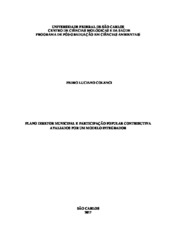| dc.contributor.author | Colenci, Pedro Luciano | |
| dc.date.accessioned | 2017-10-17T12:53:56Z | |
| dc.date.available | 2017-10-17T12:53:56Z | |
| dc.date.issued | 2017-08-03 | |
| dc.identifier.citation | COLENCI, Pedro Luciano. Plano diretor municipal e participação popular contributiva avaliados por um modelo integrador. 2017. Tese (Doutorado em Ciências Ambientais) – Universidade Federal de São Carlos, São Carlos, 2017. Disponível em: https://repositorio.ufscar.br/handle/ufscar/9156. | * |
| dc.identifier.uri | https://repositorio.ufscar.br/handle/ufscar/9156 | |
| dc.description.abstract | This thesis is about contributory participation in the elaboration and updating of urban planning and its goal is to demonstrate the influence of contributory management in the transformation processes which currently affect life in the cities and the Urban Planning processes. Thus, it describes the historic, political and legal development of the Brazilian urbanism; it also identifies the construction of urban law as an autonomous field of law, with the purpose of demonstrating that this field, notwithstanding it being an autonomous legal institute, it relies on political issues. It was analyzed the city democratic management and the limits of its contingency, it was carried out a diagnostic of the citizenry contribution effectiveness in the municipal public management, it was examined the participatory democracy in the city of São Carlos, in a direct way as well as in a secondary one, and, finally, it was explained the current phase of municipal planning through an integrating model. It is important to highlight that, parallel to this research, two other researches were conducted in order to accompany, collect data and evaluate the review process of the Strategic Plan of São Carlos city; as a result of this research, it is suggested a Maturity Model. Regarding the methodology, this work can be classified as a descriptive, exploratory research. As for the technique employed in the data collection, it was supported by bibliographic, documental research and the analysis of secondary data to be obtained from accomplished researches. As a research result, it was identified that the need to systematize the municipal planning activities results from the rational comprehensive model which derivate from a schematized model of decision making, which this study proposes to evaluate the Maturity Degree of the involved agents in the formation and reviewing process of the Urban Planning, with the aim of engaging the representatives and the people, in which technology and social science contributed to a better world and in which planning would be an important instrument to social progress. Therefore, participation seems as a fundamental element towards balance of the factors influencing the decision-making process. | eng |
| dc.description.sponsorship | Coordenação de Aperfeiçoamento de Pessoal de Nível Superior (CAPES) | por |
| dc.language.iso | por | por |
| dc.publisher | Universidade Federal de São Carlos | por |
| dc.rights.uri | Acesso aberto | por |
| dc.subject | Planejamento urbano | por |
| dc.subject | Participação democrática contributiva | por |
| dc.subject | Direito urbanistico. | por |
| dc.subject | Urban planning | eng |
| dc.subject | Democratic contributive participation | eng |
| dc.subject | Urban law | eng |
| dc.title | Plano diretor municipal e participação popular contributiva avaliados por um modelo integrador | por |
| dc.type | Tese | por |
| dc.contributor.advisor1 | Oliveira, Celso Maran de | |
| dc.contributor.advisor1Lattes | http://lattes.cnpq.br/9911833172043700 | por |
| dc.description.resumo | Esta tese trata da participação contributiva na elaboração e na atualização do planejamento urbano e tem como objetivo apresentar qual é a influência da gestão contributiva nos processos de transformação que atualmente afetam a vida nas cidades e os processos de Planejamento Urbano. Para tanto, descreve, a fim de compreender a construção histórica, política e jurídica do urbanismo brasileiro; também identifica a construção do direito urbanístico como um ramo autônomo com a finalidade de demonstrar que este ramo, mesmo sendo autônomo como instituto jurídico, é dependente dos meandros políticos. Examinou-se a gestão democrática da cidade e os limites de contingência, realizou-se um diagnóstico da efetividade da contribuição cidadã na gestão pública municipal, examinou-se a democracia participativa na cidade de São Carlos de forma direta e secundária e, por fim, explicou-se o atual estágio do planejamento municipal por meio de um modelo integrador. É importante destacar que, paralelamente a esta pesquisa, foram realizadas duas pesquisas para acompanhar, levantar dados e avaliar o processo de revisão do Plano Diretor de São Carlos; com o resultado destas pesquisas, propôs-se aqui o modelo de Maturidade. Em relação à metodologia, o trabalho pode ser classificado como uma pesquisa descritiva, exploratória. Com relação à técnica empregada na coleta de dados, apoiou-se nos procedimentos da pesquisa bibliográfica, documental e da análise de dados secundários por extrair das pesquisas já realizadas. Como resultado da pesquisa, identificou-se que a necessidade de se sistematizarem as atividades de planejamento municipal decorre do modelo racional compreensivo a partir de um modelo esquematizado de tomada de decisões, que este estudo propõe avaliar o Grau de Maturidade dos agentes envolvidos no processo de formação ou de revisão do Planejamento Urbano com a finalidade de engajamento dos representantes e do povo, no qual a tecnologia e as ciências sociais contribuíram para um mundo melhor e o planejamento seria uma importante ferramenta para o progresso social. Assim sendo, a participação aparece como elemento fundamental em direção ao equilíbrio das forças que influem no processo de tomada de decisões. | por |
| dc.publisher.initials | UFSCar | por |
| dc.publisher.program | Programa de Pós-Graduação em Ciências Ambientais - PPGCAm | por |
| dc.subject.cnpq | CIENCIAS BIOLOGICAS | por |
| dc.ufscar.embargo | Online | por |
| dc.publisher.address | Câmpus São Carlos | por |
| dc.contributor.authorlattes | http://lattes.cnpq.br/7632574186989869 | por |
